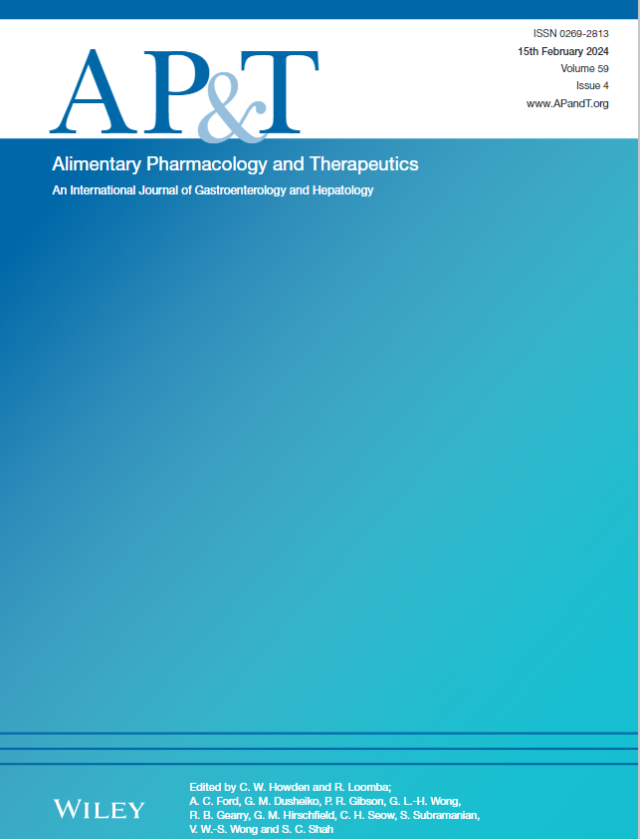Efficacy and Safety of Vedolizumab and Tofacitinib (VETO) Combination Therapy in Refractory Ulcerative Colitis Unresponsive to Anti-TNF and a Second-Line Advanced Therapy: A Prospective Cohort Nested Within a Randomised Trial.
IF 6.7
1区 医学
Q1 GASTROENTEROLOGY & HEPATOLOGY
引用次数: 0
Abstract
BACKGROUND Management of refractory ulcerative colitis (UC) unresponsive to advanced therapies is challenging. Combination therapy is a potential strategy. AIM To evaluate the safety and efficacy of vedolizumab and tofacitinib combination (VETO) therapy in patients with UC refractory to anti-TNF and unresponsive to either agent as monotherapy. METHODS We prospectively recruited patients with moderate-to-severe disease activity (Mayo score: 6-12). Patients were randomised to receive vedolizumab or tofacitinib. Non-responders were offered VETO therapy and followed for 24 weeks. The primary outcome was a combined clinical response and corticosteroid-free remission at week 24. Secondary outcomes included clinical response and remission at week 8, endoscopic remission at week 24 and incidence and severity of treatment-related adverse events. RESULTS Of 91 patients, 38 were randomised to vedolizumab and 40 to tofacitinib. Fourteen and 15, respectively, were non-responders to vedolizumab and tofacitinib; 24 received VETO with follow-up of 34 ± 16.1 weeks. Median second-line therapy duration before VETO was 21 weeks. Five non-responders received alternative interventions or were lost to follow-up. At week 8, 17 achieved clinical response and five achieved remission; three underwent colectomy. At week 24, response and corticosteroid-free remission were seen in 17 and 14, respectively; 7 achieved endoscopic remission. Mayo scores improved significantly (mean difference 5.33 ± 0.53; p < 0.01). Two patients developed pseudomembranous colitis that resolved with vancomycin. No severe adverse events occurred. CONCLUSION VETO was effective and safe in patients with UC refractory to anti-TNF and second-line therapies, with over half achieving clinical remission by 24 weeks.Vedolizumab和Tofacitinib (VETO)联合治疗对抗tnf无反应的难治性溃疡性结肠炎和二线高级治疗的疗效和安全性:一项随机试验的前瞻性队列嵌套
背景:对先进疗法无反应的难治性溃疡性结肠炎(UC)的治疗具有挑战性。联合治疗是一种潜在的策略。目的评价vedolizumab和tofacitinib联合(VETO)治疗抗肿瘤坏死因子(tnf)难治性UC患者的安全性和有效性。方法前瞻性招募中度至重度疾病活动性患者(Mayo评分:6-12)。患者随机接受维多利单抗或托法替尼治疗。无应答者给予VETO治疗,随访24周。主要结果是第24周临床反应和无皮质类固醇缓解。次要结局包括第8周的临床反应和缓解,第24周的内窥镜缓解以及治疗相关不良事件的发生率和严重程度。91例患者中,38例随机接受维多单抗治疗,40例接受托法替尼治疗。分别有14例和15例对维多单抗和托法替尼无反应;24例接受VETO治疗,随访时间34±16.1周。否决前的中位二线治疗持续时间为21周。5名无应答者接受了其他干预措施或失去了随访。在第8周,17人达到临床缓解,5人达到缓解;其中3人接受了结肠切除术。在第24周,分别有17例和14例患者出现缓解和无皮质类固醇缓解;7例获得内窥镜缓解。Mayo评分显著提高(平均差5.33±0.53;p < 0.01)。两名患者出现假性膜性结肠炎,并在万古霉素治疗后痊愈。未发生严重不良事件。结论:对于抗tnf和二线治疗难治性UC患者,veto是安全有效的,超过一半的患者在24周内达到临床缓解。
本文章由计算机程序翻译,如有差异,请以英文原文为准。
求助全文
约1分钟内获得全文
求助全文
来源期刊
CiteScore
15.60
自引率
7.90%
发文量
527
审稿时长
3-6 weeks
期刊介绍:
Alimentary Pharmacology & Therapeutics is a global pharmacology journal focused on the impact of drugs on the human gastrointestinal and hepato-biliary systems. It covers a diverse range of topics, often with immediate clinical relevance to its readership.

 求助内容:
求助内容: 应助结果提醒方式:
应助结果提醒方式:


